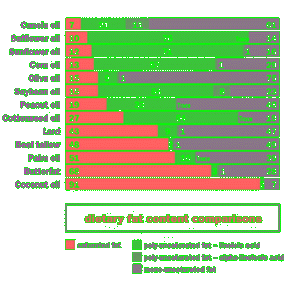|
|
||
|
Fats are terrific conduits of flavor, and as such they make the things we eat taste better. They also improve the texture and mouth feel of foods. Fats are also an energy source. They contain nine calories per gram. Carbohydrates contain four. As such, and when consumed in correct proportion to other foods, fats are a primary source of energy. The USDA recommends that people acquire 30 percent of their daily caloric intake from fats. Additionally, fats and oils help humans absorb fat-soluble vitamins, including vitamins A, D, E and K, and are necessary building blocks of cellular membranes. Sterols found in fats help hormone production and regulation, and, some evidence shows, aid in the absorption of calcium. The key is to consume the right kind of fat — unsaturated. Unsaturated fats have been shown to lower cholesterol levels. Eighty-five percent or more of the fat found in soy, rape, canola and sunflower oil is unsaturated. As a matter of contrast, beef tallow is 48 percent saturated fat.
|

